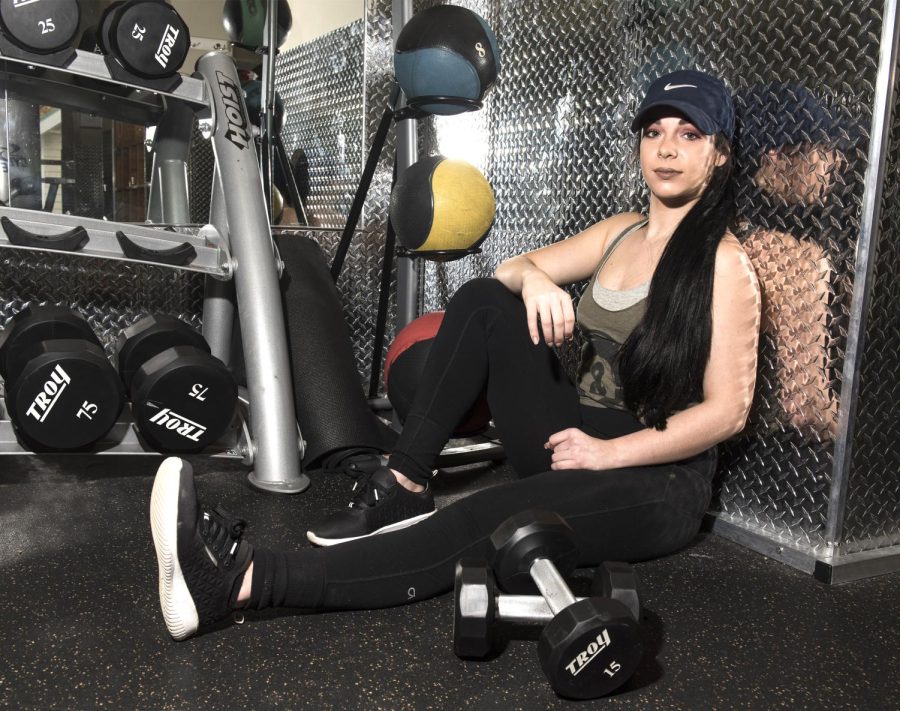Finding power in strength
Sophomore public relations major Liliana Macioce sits in the gym of University Edge apartments in Kent, Ohio, on Wednesday, Nov. 1, 2016.
November 2, 2016
It all began when she was just 13 years old. Her friends repeatedly told her their opinions. When she looked in the mirror, she didn’t like who she saw. She forced herself to create a person she didn’t want to become.
Between binge eating, excessive exercising, and eating only 360 calories a day, sophomore public relations major, Liliana Macioce had become a victim of an eating disorder.
An eating disorder can be classified as a serious physical and emotional condition that can have life-threatening effects on an individual, according to the National Eating Disorders Association. Disorders range from anorexia nervosa, bulimia nervosa, binge eating disorder and orthorexia. Many can lead to heart issues, osteoporosis, organ failure and even death — due to lack of nutrients in the body.
“An eating disorder is also a mental disorder,” said Emily Creque, vice president of Kent State’s Body Acceptance Movement (BAM). “For some, the disorders are caused by what those individuals think they look like or want to look like, such as a thin celebrity.”
Macioce developed anorexia and bulimia by her freshman year of high school, which lead to one of the most challenging obstacles of her life.
“Ever since I was really young I always felt very insecure about myself and my body image,” Macioce said. “When I was a teenager is when my eating disorder got really bad.”
At 13, Macioce had a friend who would tell her her stomach was “big.” She grew reluctant to eat, as a result. When she did eat, however, she would force herself to eat only 360 calories a day, and later self-induced vomiting.
“I often switched between bulimia to anorexia because people caught on to my bulimia,” she said.
Once Liliana reached her freshman year of high school, her hair began to fall out. She couldn’t get out of bed. Listening to her nutritionists wasn’t an option; Her family became uneasy.
“What am I even doing?” Macioce thought to herself.
By her junior year of high school, she “had fallen apart,” and became severely depressed and anxious all of the time. She stopped hanging out with her friends, and gave up on her love for dancing.
Throughout her difficult journey, Macioce said her biggest supporter and rock was her younger sister, Olivia.
“I first found out about Liliana’s eating disorder when her and my mom spent all day at the doctor’s office and wouldn’t tell me what was going on,” said 18-year old Olivia Macioce. “I was always worried about her, especially when I would go out with my friends on the weekend and she would just lay in bed.”
After multiple cycles of relapses, Macioce finally had enough (of disordered eating) by her freshman year at Kent State. Her passion for bodybuilding was then born.
The days Macioce was unable to get out of bed, she would research nutrition and more about her condition.
“I would research because I figured the more I knew, the more it might help me,” she said.
Prior to her eating disorder, Macioce was a dancer. Her mother worked at a recreational facility, leading her to already have knowledge in physical activity. After consistent research about nutrition, she fell in love with the active lifestyle and decided to try bodybuilding.
“I wanted to start a new chapter in my life,” she said.
Macioce began her bodybuilding journey two years before her first competition this past May. After her eating disorder, she took the time to re-build her strength and muscle by eating more and lifting weights. Her 360-calorie diet escalated to a 2,300-calorie diet, with the majority of her foods consisting of chicken, rice and vegetables.
During her competition season, Macioce actively keeps track of her macronutrients (macros), which consist of fats, carbohydrates and proteins.
“My macro intake increases during my training for shows, then they would be trimmed down a week leading up to my show, where I would water, sodium and carb load to fill my muscles out again,” Macioce explained.
Today, Macioce has already qualified for nationals during one of her competitions. She continues to balance her bodybuilding lifestyle and academics, while also learning to love her body.
“My ultimate definition of being ‘fit’ is to mentally and physically be in a good place,” she said.
Coincidentally, Olivia has also gone through an eating disorder, and is now a bodybuilder alongside her sister.
“We both had the same passion for bodybuilding and encouraged each other through our healing process,” Olivia said.
Macioce wants to remind others to never give up on yourself.
“If anyone is going through an eating disorder, there is a reason you’re here, and there is hope for you,” she said.
Nicole Zahn is the rec sports / wellness reporter, contact her at [email protected].












